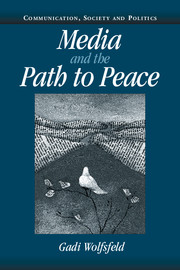Book contents
- Frontmatter
- Contents
- Acknowledgements
- Introduction
- 1 Building theory
- 2 The initial stages of Oslo
- 3 The Israeli media and the debate over Oslo
- 4 The Palestinians and the Israeli media
- 5 The media and the Israel–Jordan peace process
- 6 The media and the struggle for peace in Northern Ireland
- 7 The collapse of Oslo and the return to violence
- Conclusion
- Methodological appendix
- References
- Index
3 - The Israeli media and the debate over Oslo
Published online by Cambridge University Press: 22 September 2009
- Frontmatter
- Contents
- Acknowledgements
- Introduction
- 1 Building theory
- 2 The initial stages of Oslo
- 3 The Israeli media and the debate over Oslo
- 4 The Palestinians and the Israeli media
- 5 The media and the Israel–Jordan peace process
- 6 The media and the struggle for peace in Northern Ireland
- 7 The collapse of Oslo and the return to violence
- Conclusion
- Methodological appendix
- References
- Index
Summary
A good deal of the debate over any issue takes place within the confines of the mass media. This includes not only news and editorials but also talk-shows and the entertainment media. Each of these forums has different guidelines for deciding who can participate and how the antagonists are expected to conduct themselves. These rules are primarily designed to ensure the largest possible audience. The result is that the public is presented with a narrow, emotional, shortsighted debate in which values and ideology take a back seat to entertainment (Underwood, 2001; Delli Carpini and Williams, 2001).
One of the foundations of any democracy is that citizens be must given an opportunity to deliberate over the major issues of the day. The quality of that deliberation clearly depends on the level of information and analysis available (Bennett and Entman, 2001; Vedel, 2003). The limitations on public debate for those living in undemocratic countries are more obvious for the authorities make a concerned effort to take control over the flow of information. The problems facing western democracies are subtler and less severe. Nevertheless, media routines often prohibit any serious discussion of political issues and citizens are forced to make decisions based on an extremely limited set of information and images. As discussed, this is especially true when the media environment is dominated by sensationalist values.
It is helpful to consider what would constitute an “ideal” forum for public debate about a peace process.
- Type
- Chapter
- Information
- Media and the Path to Peace , pp. 77 - 103Publisher: Cambridge University PressPrint publication year: 2004



